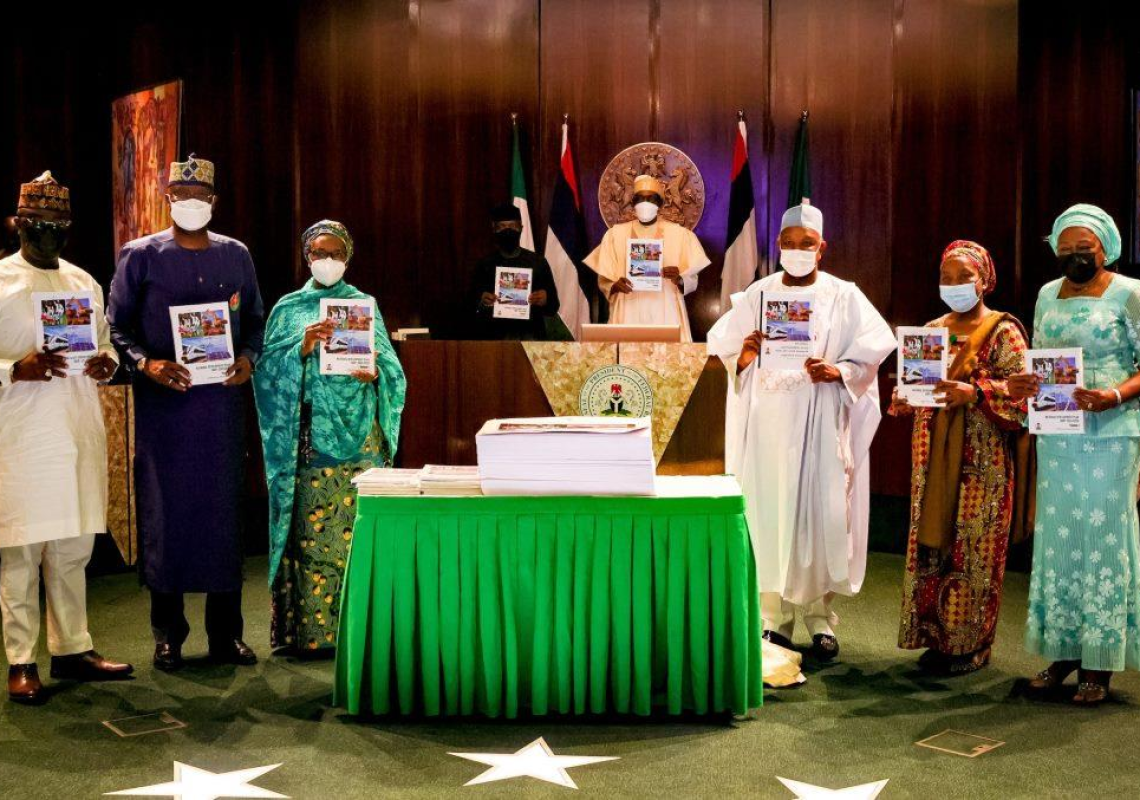Published
on
By
By Jerome-Mario Chijioke Utomi
There exist some points that highlight as impressive the recent launch at the State House, Abuja, of the National Development Plan (NDP) 2021-2025, a successor plan to both the Economic Recovery and Growth Plan (ERGP 2017-2020) and the Vision 20:2020, by the President Muhammadu Buhari led federal government.
The plan, according to Minister of Finance, Budget and National Planning, Zainab Ahmed, sets the tone for Nigeria’s next economic destination and would prioritize robust infrastructure, economic stability, improved social indicators and living conditions of Nigerians.
First, infrastructural provisions enable development and also provide the services that underpin the ability of people to be economically productive.
Infrastructure investments, from what development professionals are saying, help stem economic losses arising from problems such as power outages or traffic congestion. The World Bank estimates that in Sub-Saharan Africa, closing the infrastructure quantity and quality gap relative to the world’s best performers could raise GDP growth per head by 2.6% per year.
Another practical particular that qualifies the development as exemplary is the new awareness that for the first time in our planning history as a nation, we are having three volumes of the plan.
According to the Minister, in the past, we have always had one volume, which is the plan itself. But this time, we have three volumes.
Volume One is the main plan, and that’s what will be accessible to the public. “Volume two is then a prioritized and sequential list of programmes and projects that will be fed into the annual budgets while Volume Three are the legislative imperatives,” the Minister stated.
Again, in line with the global belief that every government must find ways to create a sustainable economy, find a solution to the harmful effects of poverty upon the poor and upon those who are not poor but know that countless men and women are ravaged by hunger but choose to look away, the plan is laced with opportunities for inclusiveness for young people, women, people with special needs, and the vulnerable ones, mainstreaming women gender into all aspects of our social, economic and political activities.
Despite the validity of these claims, there are, however, reasons for Nigerians to feel concerned.
The major tragedy linked to this concern is that the nation Nigeria is reputed for changing economic plans with every change in leadership. This fear cannot be described as unfounded as we have as a country had several economic plans in the past. A huge sum of money has been injected into it but none achieved its targeted result. They were all aborted on the way by corruption, incompetence, change in administration and in some cases a combination of these factors.
As noted elsewhere, since independence in 1960, the country has demonstrated that there is no development plan which has achieved its core objective. There is always a disturbing laxity in marching plan targets with practical and unfailing consistency. The result is that the country remains one of the most politically and economically dis-articulated countries in the world.
In view of the above fact, how sure are we as Nigerians that the FG’s present moves will depart this old order?
In my view, what has all these years abbreviated Nigeria’s socio-economic growth, or accelerated development of other nations, is by no means a function of development plans but predicated on, and traceable to the existence of deformed leadership styles.
Take, as an illustration, for most of our political history, public office holders in Nigeria assume a self-sufficient attitude, despise others and view themselves as the exclusive possessor of what they have, as well as claim excellence not possessed.
Unfortunately, such characterizes the leadership’s sphere, not just in Nigeria but Africa as a continent. A factor that’s largely responsible for leaders’ inability to provide direction, protection, orientation, shape norms or manage conflicts in their various places of authority. The bitter truth is that no matter how good a plan or system of government may be, bad leaders must bring harm to their people.
This piece is not alone in this line of argument.
While underlying the problem of Nigeria’s underdevelopment exacerbated by the failure in the leadership system, Chinua Achebe, in his book The Trouble with Nigeria, remarked that there is nothing wrong with the Nigerian land or climate or water or air or anything else. But concluded that the trouble with Nigeria is simply and squarely a failure of leadership.
Looking ahead, two questions that are as important as the piece itself are; what strategy can the nation deploy to arrest such ugly narrative in ways that will make this recently developed national plan not end in shame like previous experience but bear the targeted result?
Two, how can the nation handlers effectively diversify the nation’s revenue sources, bearing in mind that such arrangement will reduce financial risks and increase national economic stability as a decline in particular revenue source might be offset by an increase in other revenue sources?
The above questions call on leaders in the country to reassess their priorities via the development of the ability to give every citizen a stake in the country and its future by subsidizing things that improve the earning powers of citizens- education, housing and public health and placement of emphasis on, and understanding that the economy would look after itself if democracy is protected; human rights are adequately taken care of, and the rule of law strictly adhered to.
Again, as the nation celebrates the National Development Plan 2021-2025, which we are yet to be sure if it will achieve the targeted result, one point we must not fail to remember is that Nigeria, according to a report, is the only, or among the few oil-producing countries without adequate metering to ascertain the accurate quantity of crude oil produced at any given time.
What the above tells us as a country is that there is more work to be done and more reforms to be made.
Finally, while it is evident, to use the words of the Minister, that the current plan has the future we all desire and will play a sizeable role in the product complexity space internationally and adopt measures to ease constraints that have hindered the economy from attaining its potential, particularly on the product mapping space. That notwithstanding, the masses must develop a keen interest in holding their leaders accountable.
Jerome-Mario Chijioke Utomi is the Programme Coordinator (Media and Public Policy), Social and Economic Justice Advocacy (SEJA), Lagos. He could be reached via jeromeutomi@yahoo.com/08032725374.
Why Seplat Sacked Avuru as Non-Executive Director
Supply Shortages in Nigeria, Others Lift Oil Prices
FG to Inject N381trn into Economy to Create Job, Tackle Poverty
Published
on
By
By Adedapo Adesanya
There was a fresh buying appetite on the floor of the NASD Over-the-Counter (OTC) Securities Exchange on Wednesday, triggering a 0.89 per cent growth at the close of transactions.
It was a return to the market after a two-day break to celebrate Christmas as the NASD OTC exchange was closed on Monday and Tuesday (December 27 and 28).
Yesterday, the volume of shares transacted by investors increased significantly by 37,615.3 per cent to 50.4 million units from the 133,621 units traded at the last trading session, which was last Friday.
Also, the value of shares transacted by market participants appreciated broadly by 5,973.6 per cent to N901.3 million from N14.8 million, while the number of deals remained unchanged at five deals.
At the close of transactions, the NASD Unlisted Security Index (NSI) improved by 6.57 points to settle at 741.39 points compared with 734.82 points of the previous session.
In the same, the market capitalisation appreciated by N5.56 billion to close the day at N627.79 billion in contrast to N622.23 billion of the preceding session.
It was observed that the growth witnessed yesterday was as a result of the gains posted by Central Securities Clearing Systems (CSCS) Plc and UBN Property Plc.
CSCS appreciated by N1 or 5.6 per cent to trade at N18.00 per unit compared with the previous N17.00 per unit, while UBN Property Plc gained 10 kobo or 8.7 per cent to wrap the day at N1.15 per unit as against the previous N1.05 per unit.
Business Post reports that Food Concepts Plc remained as the most active stock by volume (year-to-date) as it has traded 11.4 billion units of its shares for N14.4 billion, Lighthouse Financial Services Plc trailed with 1.1 billion units traded for N546.2 million, with Geo Fluids Plc trading 1.0 billion units worth N700.1 million to occupy the third position.
Also, Food Concepts Plc was the most traded stock by value (year-to-date) with the sale of 11.4 billion units of its securities for N14.4 billion, followed by Nigerian Exchange (NGX) Group Plc with a turnover of 456.5 million units valued at N9.2 billion, and VFD Group Plc with the sale of 10.4 million units worth N3.5 billion.
Published
on
By
By Adedapo Adesanya
The Naira returned from the Christmas holiday stronger against the US Dollar on Wednesday, gaining 10 kobo or 0.02 per cent at the Investors and Exporters (I&E) segment of the foreign exchange (forex) market.
Data showed that the local currency was traded yesterday at the window at N415.00/$1 compared with N415.10/$1 it closed at the session, which was on Friday, December 24.
This happened on the back of a 29.1 per cent or $49.14 million fall in the value of FX trades recorded at the market segment during the midweek session.
Business Post gathered that the turnover for the trading day was $119.48 million as against the $168.62 million recorded at the previous session.
However, at the interbank segment of the market, the Nigerian Naira recorded a flat outcome against the American currency to finish at N411.95/$1.
In the same vein, the domestic currency closed flat against the Pound Sterling and the Euro on Wednesday at the same forex market window at N552.75/£1 and N466.82/€1 respectively.
Meanwhile, at the cryptocurrency market, eight of the 10 digital coins tracked across several trading platforms pointed south amid a rising number of cases of the omicron variant.
In addition, environmental, social and governance investing and concerns over energy use have also been a catalyst in recent crypto declines.
The highest loser was Binance Coin (BNB) as it retreated by 4.6 per cent to trade at N211,229.85. Dogecoin (DOGE) depreciated by 4.4 per cent to trade at N97.54, Ripple (XRP) declined by 3.8 to sell at N463.15, while Dash (DASH) recorded a 3.5 per cent depreciation to N75,251.82.
In addition, Cardano (ADA) fell by 3.4 per cent to trade at N760.27, Bitcoin (BTC) saw a 2.5 per cent depreciation to settle at N26,183,902.21, Litecoin (LTC) fell by 0.7 per cent to trade at N83,908.25, while Ethereum (ETH) declined by 0.5 per cent to sell at N2,145,000.00.
Conversely, Tron (TRX) appreciated by 4.1 per cent to trade at N44.67, while the United States Dollar Tether increased by 2.6 per cent to quote at N573.85.
Published
on
By
By Adedapo Adesanya
The price of the Brent further rose on Wednesday and moved closer to $80 as data from the Energy Information Administration (EIA) showed an inventory draw of 3.6 million barrels for the week to December 24.
Yesterday, the value went up by 30 cents or 0.24 per cent to trade at $79.47 per barrel, while the United States West Texas Intermediate (WTI) crude rose by 37 cents or 0.28 per cent to sell at $76.84 per barrel.
At 420 million barrels, crude oil inventories remain 7 per cent below the five-year average—compared to 8 per cent below the five-year average last week.
On Tuesday, the American Petroleum Institute (API) estimated a crude oil inventory draw of 3.09 million barrels for the week to December 24.
Oil prices, however, remain under pressure from concerns about the new coronavirus strain, Omicron, which has triggered fresh restrictions in certain countries.
China, the world’s biggest oil importer, reported 207 new confirmed coronavirus cases and 27 new asymptomatic cases but with no new deaths.
The average number of daily confirmed coronavirus cases in the US hit a record high of 258,312 over the last seven days while Australian cases hit a new record of more than 19,000 daily infections.
Although the surge in COVID-19 cases is expected to temporarily slow, it may affect the recovery in oil demand that is underway with forecast trimming oil demand for this year and next to reflect risks and uncertainty brought on by the variant.
Supporting the market was news that the governments around the world were trying to limit the impact of record numbers of new COVID-19 infections on economic growth by easing testing rules and narrowing who needs to isolate as close contacts of positive cases.
Oil prices have been supported by producers like Nigeria, Ecuador, and Libya declaring forces majeures this month on part of their oil production because of maintenance issues and oilfield shutdowns.
Russian Deputy Prime Minister, Mr Alexander Novak said that the Organisation of the Petroleum Exporting Countries and allies (OPEC+) has resisted calls from the US to boost output because it wants to provide the market with clear guidance and not deviate from the policy on gradual increases to productions.
The group is meeting on January 4 to decide whether to proceed with a planned production increase of 400,000 barrels per day in February.
Davos was Different this year
Kwara Disburses N1.7b For Projects
Lagos Seals Western Lodge Hotel In Ikorodu
How To Link Your MTN, Airtel, Glo, 9mobile Lines to NIN
How To Identify Fake Naira Notes
Sort Codes of GTBank Branches in Nigeria
NSE Market Capitalisation Sheds N76b as Sell‐offs Persist
FAAC: FG, States, LGs Share N655.18b in January
Copyright © 2021 BusinessPost






